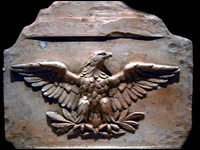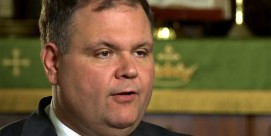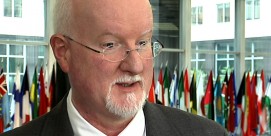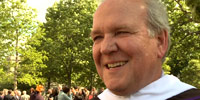In This Episode << SLIDE LEFT TO SEE ADDITIONAL SEGMENTS
God and Empire
by David E. Anderson
I chant the new empire grander than any before, as in a vision it comes to me
I chant America the mistress, I chant a greater supremacy
–Walt Whitman, “A Broadway Pageant”
Reading the foreign policy positions of the top Democratic and Republican presidential candidates in a series of articles published in Foreign Affairs earlier this year, one found many descriptions of the United States. But not one of them used the “E” word — empire.
Similarly, the estimable Review of Faith & International Affairs, an evangelical quarterly, while exploring a host of issues such as globalization, foreign aid, religious freedom, and faith-based diplomacy, offers no indication its analysts recognize the possibility of American empire and its ethical and theological implications.
Yet as Gary Dorrien wrote four years ago in “Imperial Designs,” an article in the journal CrossCurrents (he has also published a book by the same title), “most of the world has no doubt that the U.S. is an empire, but now it has plenty of doubt about the kind of empire that the U.S. wants to be.”
Americans, however, don’t want to believe the United States is an empire. That reluctance was underscored in a 2003 debate sponsored by the American Enterprise Institute, a conservative think tank, between British historian and journalist Niall Ferguson and neoconservative foreign policy advisor Robert Kagan, a founder of the Project for a New American Century and a leading advocate of the American invasion of Iraq. Ferguson, author of the book COLOSSUS: THE PRICE OF AMERICAN EMPIRE, argued the affirmative, saying, after a brief survey of American military, economic, and cultural power, that from a British perspective “the only thing that is really quite remarkable about the American empire … is the fact that … [t]his is an empire in denial. It is an empire that refuses to acknowledge its own existence.”
Kagan accepted Ferguson’s description of the vastness of American power but rejected the word “empire” as a description, preferring “global power” or “hegemon.” Colonies are the touchstone of empire, he said, and he argued that while America had an imperial past, “as American imperialism diminished, American power grew.” There is a difference between being the world’s greatest power, he suggested, and “a country that seeks to exercise dominion over others, which is what the true definition of empire is.”
More recently, in his book THE RETURN OF HISTORY AND THE END OF DREAMS, Kagan continues to think about the world not in terms of empire but of power, suggesting that Americans both desire and rue their role: “Americans want what they want, and not just economic opportunity and security but also a world that roughly suits their political and moral preferences. They would naturally prefer not to pay a high price for such a world, however, and it is not only the financial price Americans would like to avoid, or even the cost in lives. It is also the moral price, the ethical burdens of power.”
But Kagan’s narrow meaning of “empire” and his preference for “power” are generally seen by both conservatives and liberals as an effort to substitute euphemism for plain speaking. Dorrien, the Reinhold Niebuhr Professor of Social Ethics at Union Theological Seminary, for example, makes the case that since 1989 and the fall of the Soviet Union, “the United States has forged a new kind of empire — one not based on the conquest of territory — that outstrips all colonizing empires of the past.”
“It is imperial,” he adds, “in the sense of enforcing its own idea of world order in America’s interest, presuming the right to lay down the rules of trade, commerce, security, and political legitimacy. It rewards or punishes nations on the basis of their willingness to create open markets, support American military policies, and establish pro-American governments.”
But admitting to being an empire “would be admitting that the United State some day in some way will decline and fall,” according to historian Walter Nugent, and “that would contradict the nation’s historic sense of mission. How could the United States spread liberty, democracy, freedom, and free enterprise if it declined and fell? Those are perennial values, part of human rights and human nature at its best, are they not?” he asks in his book HABITS OF EMPIRE: A HISTORY OF AMERICAN EXPANSION.
Author and scholar Chalmers Johnson, in an exhaustive but pessimistic trilogy (BLOWBACK, THE SORROWS OF EMPIRE, and NEMESIS) that is part of a series of books known as THE AMERICAN EMPIRE PROJECT, defines empire in a fashion similar to Dorrien as “one nation imposing its will on others through the threat or actual use of force.” Johnson is a pessimist because he thinks the effort to project American power abroad in various ways — from some 860 overseas military installations acknowledged by the Department of Defense to the invasions and incursions carried out by the United States in recent years, as well as the myriad of domestic national security measures such as warrantless wiretaps — suggests the “political system may no longer be capable of saving the United States as we know it, since it is hard to imagine any president or Congress standing up to the powerful vested interests of the Pentagon, the secret intelligence agencies, and the military-industrial complex.”
“The collapse of the Roman Republic,” he writes, “offers a perfect case study of how imperialism and militarism can undermine even the best defenses of democracy, while enthusiasts for the American empire systemically prettify the history of the British Empire in order to make it an acceptable model for the United States today.”
Johnson is sharply critical of the Bush administration and its approach to the war on terror, including the interventions in Iraq and Afghanistan as well as the extraordinary doctrine of a consolidated executive power created in the Department of Justice and the office of the vice president. But in his trilogy Johnson traces the pernicious militarization of American foreign policy well back beyond the Bush administration to the 1950s, when the United States helped overthrow the democratic government of Iranian prime minister Mohammed Mossadegh.
Similarly, but from an opposite point on the political spectrum, there is the prolific Andrew Bacevich, a socially conservative Roman Catholic, West Point graduate, and Vietnam veteran who cut his analytical teeth writing for conservative journals such as National Review and The Weekly Standard but who now finds a warmer welcome in the pages of Commonweal and The Nation. In his seminal work, THE NEW AMERICAN MILITARISM, published in 2005, Bacevich avoids the word “empire.” (It is prominent, however, in his 2002 book AMERICAN EMPIRE, where he describes the United States as a country “committed irreversibly to the maintenance and, where feasible, expansion of an empire that differs from every other empire in history,” and in THE IMPERIAL TENSE: PROSPECTS AND PROBLEMS OF AMERICAN EMPIRE, a 2003 collection of essays by writers that include American man of letters Wendell Berry and professor of philosophical theology John Milbank, edited by Bacevich.) But his taxonomy of the militarization of American foreign policy follows some of the same paths as Johnson, and it is as troubled and cautionary as anything coming from the liberal left.
“Well before Sept. 11, 2001, and before the younger Bush’s ascent to the presidency, a militaristic predisposition was already in place both in official circles and among Americans more generally,” Bacevich writes in THE NEW AMERICAN MILITARISM, tracing the story back to the presidency of Woodrow Wilson and his 1917 vision of a New Diplomacy. That vision included self-determination, freedom of the seas, economic openness, disarmament, nonintervention, and a “covenant of cooperative peace.”
“God Himself willed the universal embrace of American principles,” Bacevich writes of Wilson. “Of this the president was certain.”
Bacevich brings the Wilsonian paradigm forward through more recent history, including the Carter, Reagan, and Clinton administrations, with especially good chapters covering the rise of neoconservatives, who provided the moral passion and journalistic drum beat for the first-strike invasion of Iraq, and the Cold War nuclear strategists such as Herman Kahn and Albert Wohlstetter, who did so much to make the unthinkable not only thinkable but agreeable, too.
But the special contribution of THE NEW MILITARISM is Bacevich’s chapter on the generally neglected role of conservative evangelicals and their “highly permissive” interpretation of the just war tradition in militarizing America. “Militant evangelicals,” he writes, “imported religious sanctions to the militarization of U.S. policy and helped imbue the resulting military activism with an aura of moral legitimacy.” Bacevich looks at how “[f]or generations, American evangelicals had cultivated a robust anti-war tradition” and then abandoned it with their embrace of the Vietnam war and a proclivity to see military culture as an antidote to what they believed was the moral decline of the general culture.
In addition, Bacevich argues that many evangelicals “view the requirements of U.S. national security in the here-and-now and the final accomplishment of Christ’s saving mission at the end of time as closely related if not indistinguishable.” Yet he also notes that moderate evangelicals, such as those aligned with the National Association of Evangelicals, have begun since the 1990s to put more emphasis on fighting global poverty and AIDS and responding to the plight of persecuted Christians. “When it comes to the use of force, therefore, the knee-jerk bellicosity that Christian conservatives had manifested in the late 1970s and 1980s waned.”
Still, Bacevich concludes, the overall contribution of conservative Christians since the end of Vietnam has been to confer “a presumptive moral palatability on any occasion on which the United States resorts to force.”
In his latest book, THE LIMITS OF POWER: THE END OF AMERICAN EXCEPTIONALISM, Bacevich turns to theologian Reinhold Niebuhr as “the most clear-eyed of American prophets” to “help us discern a way out” of our penchant for military might, and to the Old Testament (“Set thine house in order,” 2 Kings 20:1) to warn us about the consequences of war and empire for our national life. But the “moral palatability” of the use of force has long been an issue Christianity has wrestled with as it has negotiated various empires. It is, after all, a religion that was cradled in empire and throughout its more than 2,000-year history has found itself both adversary and handmaiden to empire and emperors.
Many theologians, church historians, biblical scholars and others have begun exploring these tangled threads in hopes of providing some guidance for Christians as they either confront or cooperate with American empire. Following on Bacevich’s biblical allusion, poet and peace activist Daniel Berrigan has written a bracing commentary on 1 and 2 Kings called THE KINGS AND THEIR GODS: THE PATHOLOGY OF POWER. It is laced with steely observations about the prospering of empire (which is linked, Berrigan suggests, to the absence of prophets) and the resemblances of American empire to the harsh era of the kings of Israel in the time between David and Isaiah.
In MATTHEW AND EMPIRE, New Testament professor Warren Carter examines the political claims and visions of social organization found in the Gospel of Matthew, which he describes as “a theological challenge to Rome’s imperial propaganda.” Biblical studies professor Neil Elliott interprets Paul’s Letter to the Romans “in the shadow of empire” in a book entitled THE ARROGANCE OF NATIONS, and he makes a case for “the counter-imperial aspects” of Paul’s rhetoric. In THE POWER OF THE WORD: SCRIPTURE AND THE RHETORIC OF EMPIRE, feminist scholar Elisabeth Schussler Fiorenza calls for an effort to “deconstruct the language of imperial domination in which scriptural texts remain caught up.”
THE AMERICAN EMPIRE AND THE COMMONWEALTH OF GOD by David Ray Griffin, John Cobb Jr., Richard Falk, and Catherine Keller includes a section of “religious reflections” that touch on themes such as resurrection and omnipotence and their relationship to empire. Another group effort at theological commentary on empire has its roots in a 2007 seminar convened by the Lutheran World Federation at Luther Seminary in St. Paul, Minnesota, “part of discussions occurring among Christians all over the world as they seek to give public evangelical witness to Jesus Christ in the midst of empire,” according to seminary president Richard Bliese. The responses of more than a dozen seminar participants to how religion supports the ways of empire and how people might live out their faith in contrast to those ways have been gathered into a volume on BEING THE CHURCH IN THE MIDST OF EMPIRE: TRINITARIAN REFLECTIONS, edited by Karen L. Bloomquist.
Richard A. Horsley argues in several books that Americans are uncomfortably discovering their country’s role in the world is not unlike that of the Romans. “Many Americans are beginning to sense a serious discrepancy between prominent strands in their historical identity and the realities of their current position in the world,” he writes in JESUS AND EMPIRE: THE KINGDOM OF GOD AND THE NEW WORLD DISORDER. Indeed, some Americans “cannot avoid the awkward feeling that they are now more analogous to imperial Rome than they are to the ancient Middle Eastern people who celebrated their origins in God’s liberation from harsh service to a foreign ruler and lived according to the covenantal principles of social-economic justice.”
Horsley, who has also edited IN THE SHADOW OF EMPIRE: RECLAIMING THE BIBLE AS A HISTORY OF FAITHFUL RESISTANCE, a collection of essays on how to read the Bible as a reaction to empire and a call to oppose imperial power in every age, observes that despite the unease Americans feel about the United States as an empire they cannot grasp Jesus’ message as it is directed to that empire because Jesus has been domesticated and his message depoliticized by generations — indeed centuries, stretching back to the early church — that have, in the interest of survival or power, compromised with empires. Further, he argues, since the Enlightenment they have cooperated in severing the religious from the political and economic, making of them realms that have little to do with one another, a separation that would not have been understood by or even conceivable to Jesus and his first followers.

Horsley’s work is an effort to uncover and recover the social, political, and economic elements in Jesus’ message that have been obscured by severing the religious and the political and to look at how Jesus responded to the imperial Roman order and the nature of the movement initiated by Jesus, the early disciples, and even Paul. “The legacy of Jesus and his first followers thus included an expanding and periodically revived movement of opposition to the Roman Empire,” Horsley concludes. “Moreover, the communities of the movement constituted alternative values, social relations, and to a degree an alternative society to the Roman imperial order. … The empire had indeed killed Jesus, but his crucifixion became a symbol of opposition to the empire and an inspiration for many in their desire to sustain an alternative society.”
“Religious leaders need some acquaintance with issues of empire in the Bible, which has been so influential in shaping the American identity,” Horsley suggests, as American power and behavior in the world “come to the fore in public discussion.” Another essay collection, ANXIOUS ABOUT EMPIRE, edited by Yale Divinity School communications professor Wes Avram, is a “gathering of Christian voices expressing a certain anxiety in our time and so beginning to imagine something else than what is ruling the day.” From sociologist Robert Bellah (“Could we use our vast imperial power to transcend the idea of empire?”) to Congregational minister and writer Lillian Daniel (“The church must discuss empire, not in the way we discuss so many other things — by hiring a few academics to lecture to a few interested clergy and calling it a day — but in the way the early church must have discussed Caesar: We need to talk as Christians, not the way the world talks.”) and including essays in between by Wendell Berry, Jean Bethke Elshtain, and a range of ministers, professors, and religious leaders, this volume brings theological and ethical thinking to bear on American power and its role in the world.
Religion scholar John Dominic Crossan, in GOD AND EMPIRE, a study of the early Christian movement as well as empire, posits a broader understanding of empire than most and contrasts it with his understanding of the kingdom of God as championed by Jesus and Paul. But the biblical witness and historical development of the church don’t always make that easy. “How is it possible to be a faithful Christian in an American Empire facilitated by a violent Christian Bible?” he asks. The answer, he says, is in the radical nonviolence of God’s justice.
For Crossan, empire and civilization are essentially equivalent. Civilization itself, he writes, “has always been imperial — that is, empire is the normalcy of civilization’s violence.” America and the Rome of Jesus and Paul are not that different from one another. “As the greatest pre-industrial and territorial empire — just as we are the greatest post-industrial and commercial empire — Rome was the expression, no more and no less, of the normalcy of civilization’s violence, first-century style.” Violence is the defining characteristic of civilization and thus of empire.
Over against this, Crossan understands Jesus — and later Paul — as proclaiming the kingdom of God, a nonviolent transformation of the world into holiness: “Jesus was promulgating not just a vision or a theory but a praxis and acommunal program.” Basically, it was rooted in mutuality, the sharing of healing and eating in contrast to the violence of the Romans’ “greed community,” established from the top down. As Bruce Lincoln, a professor of the history of religions, suggests in his book RELIGION, EMPIRE, AND TORTURE, a case study of the ancient Persian empire with a postscript on Abu Ghraib, “the longer empire endures, the more often its personnel are called on to engage in acts that under other circumstances they would consider unjustified, even repugnant.”
Joerg Rieger, professor of systematic theology at the Perkins School of Theology at Southern Methodist University, takes a slightly different tack in his book CHRIST AND EMPIRE: FROM PAUL TO POSTCOLONIAL TIMES. He more closely investigates the broad sweep of Christian history by a close reading of a number of representative Christian thinkers, from Paul to former Catholic priest and contemporary theologian Matthew Fox to, in one chapter, an event — the formulation of the Nicene Creed. Other figures included from across the centuries are Anselm of Canterbury, German theologian and philosopher Friedrich Schleiermacher, and Church of Sweden bishop Gustaf Aulen.
Technically, Rieger’s book is an examination of christology — how the person and works of Jesus Christ are understood by Rieger’s chosen thinkers and how their particular view of Jesus’ human and divine nature relates to the empires in which they found themselves. “Throughout its history,” Rieger writes, “christology has been employed both in support and critique of empire, and there is only a thin line between the two.”
In particular, Rieger seeks to identify in each theologian elements in their understanding of the nature of Jesus and his ministry that allowed for resistance to empire, whether it was the Roman Empire, Spanish colonialism, or the neocolonial era following World War II. He calls this phenomenon, rather clumsily, a “christological surplus” — that which escapes the powers that be and that can’t be controlled or assimilated by “the system,” he says by way of explanation. Then he argues that such a “surplus” can provide resources for contemporary Christians in their own resistance to identifying their Christian faith with the American empire: “While large parts of the development of christology beg to be understood in their relation to empire, empire can hardly control all of our thinking about Christ, and here lies a very strong reason for hope.”
But Rieger also observes that “modern theology, by and large, is not aware of its colonial underpinnings” and suggests that what allows for resistance to contemporary manifestations of empire in theological thought can only be found by “facing the encroachment of empire head-on.”
Rieger has also edited, with Kwok Pui-lan and Don H. Compier, a useful companion volume, EMPIRE AN THE CHRISTIAN TRADITION: NEW READINGS OF CLASSICAL THEOLOGIANS. Covering much of the same ground and some of the same historical figures as CHRIST AND EMPIRE, it includes introductory pieces by the editors on the topic of empire and theology, followed by more than two dozen essays on Christian figures from Augustine and Aquinas to Julian of Norwich, Luther, Calvin, John Wesley, Frederick Douglass, Soren Kierkegaard, Karl Barth, Reinhold Niebuhr, Simone Weil, and more, describing them all as “concrete historical examples of the relationship between religion and empire.”
President Eisenhower, in his first inaugural address, said that “we Americans know and we observe the difference between world leadership and imperialism.” But do we? Have we become “overcommitted abroad and rusted out at home, like Rome in its last two centuries,” as Cullen Murphy asks in ARE WE ROME? THE FALL OF AN EMPIRE AND THE FATE OF AMERICA. While the drawn-out war in Iraq and the waning of neoconservative influence in the lame-duck days of the Bush administration have muted the imperial rhetoric of American policy-makers and perhaps even wounded and damaged the military and economic forces the United States deploys in pursuing its imperial goals, there is as yet no sign the American empire is about to fall.
Nor is it likely the November 4 election will significantly alter the current situation. But however the new administration’s foreign policy plays out, theologians and ethicists will surely continue to address and measure those policies in light of the emerging field of “empire studies.”
David E. Anderson, senior editor at Religion News Service, has written recently for Religion & Ethics NewsWeekly on subjects ranging from the ethics of torture and religion in American poetry to John Donne, William Shakespeare, and Marilynne Robinson.







